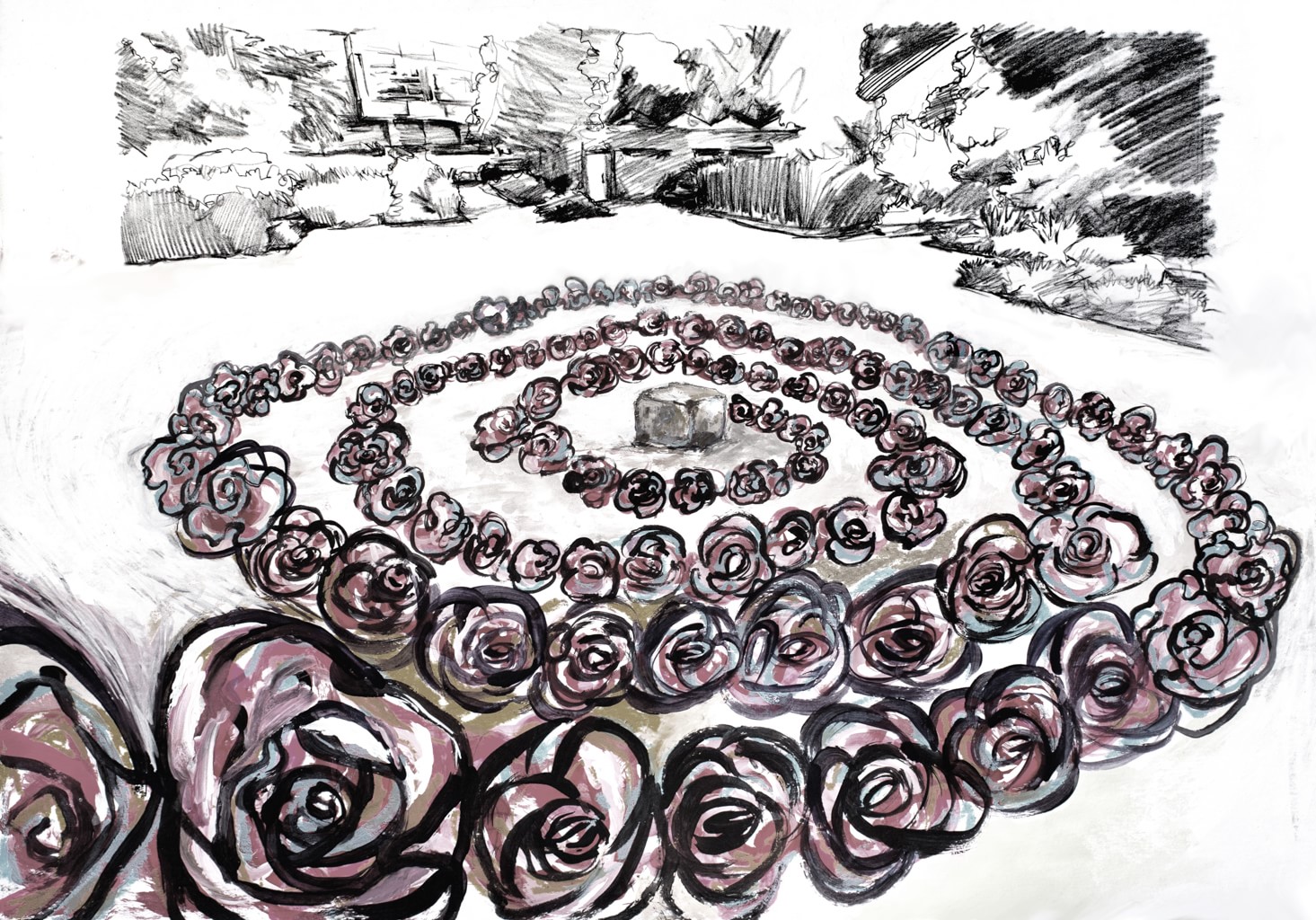
“So many things we achieve are achieved only through struggle and conflict, not in easy ways. They always seem to involve crosses. I have so longed to find somewhere in life some corner where joy is unmingled with pain. But I have never found it. Wherever I find joy, my own or other people’s, it always seems to be mingled with pain. And I find that the people I most respect are people who know the link between joy and pain. And I have found that if we will own pain and weep over it together, we also find Christ’s overflowing comfort. The bad news is that there may be no corner of reality where joy is not related to pain. The good news is that there is no corner of reality where pain cannot be transformed into overflowing joy.”
+ from John Goldingay, professor of Old Testament, in his book Walk On: Life, Loss, Trust, and Other Realities
“For me one of the most important aspects of loss is lament, and what it means to cry out to God. So many of the psalms that are in the Old Testament are lament psalms. There are psalms of begging for justice, there are psalms of ‘Why, God, why would you allow this to happen?’ There are psalms of ‘I’m desperately sorry’ or ‘I’m desperately afraid.’ Having that as something to turn to helps me articulate confusion or disorientation, of not knowing where God is. I can speak those words to God, shake my fists, and say, ‘this should never have happened.’ I think we can all say that: ‘this should never have happened.’ The tragedy of this, the pain that’s in the family, the pain that’s in the suspect—it should never have happened. Standing there with God is how I’ve found holy ground in that space. I trust that God is there with me and will remind me of times to pray and will also remind me of joy.”
+ Cynthia Ericksson [left, PhD ’97], associate professor of psychology, from the trauma forum sponsored by Fuller Pasadena for community members following the murder of two friends of Fuller from the local neighborhood
“The promises which we hold by faith concerning a new humanity, where death is removed and where there will be no more pain and tears, no more sorrow and suffering, these promises give substance to our faith; they are not meant to be the bread we eat, the water we drink, not the medicine we take when we are sick. Nor are these promises of ultimate health and eternal life given to us so that we might despise the penultimate life, with its sorrows and sicknesses. This Christian perspective is not easy to sustain. Some lose sight of the promises altogether and sink into the present reality with a fatalism and despair which concedes all hope to the inevitable victory of sickness and death. Others grasp at the promises with spiritual and emotional fanaticism, living on the precarious edge of the miraculous and the fantastic.”
+ from Ray Anderson, past professor of theology and ministry, in his book Theology, Death, and Dying

“Jesus had seen that only those who mourn will be comforted (Matt. 5:4). Only those who embrace the reality of death will receive the new life. Implicit in his statement is that those who do not mourn will not be comforted and those who do not face the endings will not receive the beginnings. The alternative community knows it need not engage in deception. It can stand in solidarity with the dying, for those are the ones who hope. Jeremiah, faithful to Moses, understood what numb people will never know, that only grievers can experience their experiences and move on. I used to think it curious that when having to quote Scripture on demand someone would inevitably say, ‘Jesus wept.’ But now I understand. Jesus knew what we numb ones must always learn again: (a) that weeping must be real because endings are real and (b) that weeping permits newness. His weeping permits the kingdom to come.”
+ from Walter Brueggemann, in The Prophetic Imagination. Brueggemann will be the featured speaker at the annual Fuller Forum in 2015.
“Out of our experience of God’s faithfulness, we learn how to be faithful to one another in our willingness to be present with all our vulnerabilities. Our presence to one another mediates God’s presence to us. The abiding certainty of God’s presence is not and cannot be a substitute for our presence—being the face of God to each other. God’s compassionate presence is mediated in the caring presence of God’s people. Just as we know that nothing—pain, suffering, even death—can separate us from the compassionate love of God, so we stubbornly refuse to let anything intervene in our presence with those who suffer.”
+ from David Augsburger, past senior professor of pastoral care and counseling, from his baccalaureate sermon in 2012
“Jesus still puts himself into the shoes of anyone who suffers. If you want to know who the vicar of Christ is, find yourself a hurting human being in your neighborhood. Jesus is found where people are putting up with things they want to go away, trying to cope when everything is all wrong. He is represented on earth by the wounded. He is not among them as a visitor, not even as a comforting friend. He is one of them; he is any or all of them. Talk about transference of one’s identity; in his mind, Jesus becomes the human sufferer. Jesus points to suffering people and says, ‘There I am.’ He says it because he feels it. He feels their hurt and, in the sharing of pain, equates the sufferer with himself. Jesus is your hurting neighbor. He is your hurting child. He is your hurting enemy. He is anyone who is suffering from anything not of his or her own choosing. If you feel the hurts of any person who hurts, you are suffering with Jesus.”
+ from Lewis Smedes, past Fuller professor of theology and ethics, in How Can It Be All Right When Everything Is All Wrong?
“Lament is a healthy and biblical practice. We don’t want to be fearful of peoples’ pain; we want to join them in lament. In our Touchstone course, we talked about how laments are left out of worship and liturgy, and we asked students to write their own laments in formation groups. After each student shared, we had a moment of silence to hold their lament before God, and then we offered words of encouragement. When we finished, I closed us in prayer in gratitude. It felt like such holy ground; there were deep recognition and connectedness that took place. I’ve been in a lot of worship services where I walked out thinking, ‘was God there?’ The depth of the cries of their hearts in that circle—there’s no doubt to me that God was there. They expressed how the practice of lament was even therapeutic and the idea of expressing their deepest pain, anger, and frustration to God in community was surprisingly healing.”
+ Christian Drez [MAT ’06], was the founding director of staff spiritual formation at Fuller Pasadena in the new Vocation and Formation department. He served as a small group leader and mentor in the recently redesigned curriculum, a key component of which is small group mentoring to help students learn spiritual practices and to process what they are learning in their larger classes.
Waiting
I want to tell the flowers that bloom and surely fade,
That though just slightly longer, our lives look much the same.
I want to tell the ocean that our salty tears are identical,
And when they flow, they pour. To stop them? Impossible.
I want to tell the earth, I stand in solidarity with its pain,
Waiting for our Redeemer to come, to come again.
I want to tell the trees that live before we cut them down,
Our lives were equally undervalued while rooted in this town.
I want to tell Mike Brown, you’re not guilty for your death,
Or free Eric Garner, and say, “Take your deep breath.”
I want to tell Trayvon Martin to eat a rainbow full of Skittles,
Or cry with John Crawford for there was very little
He could have done to protect himself
While holding a toy gun, standing in innocence at a toy shelf.
I want to tell their weeping mothers that hope will make them stronger.
And tell their angry fathers that their waiting is only a little longer.
I want to tell America that the system was always broken.
I want to tell these institutions, I will no longer be your token.
I want tell the mountains that quake and vomit for release
That I share your gut-wrenching longing and desperation for peace.
I want to tell the church that this pain runs too deep,
Yet the pain is ours while we wait, to share, to keep.
As God keeps us near the cross, filled with suffering and hope,
As love invites us to live, while fear whispers, “just cope.”
I beg you, wait in the gift of the present and pray for days of justice to come,
When we’ll have no more need for trials, when God’s loving will is done.
But for now, I need to tell the sand that we are both worn down rocks;
And since the clock never stops to give us room to catch up,
We fade into the whispers of time, blown into chaos by the wind,
Hoping for our Redeemer to come, to come again.
I want to tell our brothers who lost their wives this year,
That as you long to see her, God sees your every tear.
I want to tell our students who struggle with their call,
Be present where you are, and try to give your all.
Where you want to be, is not where you need to be,
And where you need to be is here.
So unwrap your thoughts and lift them out of unnecessary fear.
You’ll miss living when your mind is too busy trying to define
A purpose for your life three years or even three months down the line.
I want to tell all Fuller, “Yeah, sometimes it’s hard to wait.”
But, Christ promises to be with us forever and always.
So we must wait like the earth through clarity, confusion, wholeness, and pain,
Hoping for our Redeemer to come, to come again.+ This poem by Jeanelle Austin [MDiv ’13] was delivered in chapel on the Pasadena campus as an expression of lament.

+ Sketch by student Eric Tai of a prayer labyrinth built of flowers. The installation at the Pasadena campus was a joint effort by the Chapel team and the Fuller Arts Collective intended to facilitate the spirit of lament and anticipation that marks the season of Advent.
Further Reading
A Liturgy of Grief: A Pastoral Commentary on Lamentations
Leslie Allen (Baker Academic, 2011)
23 Days: A Story of Love, Death and God
Francis Bridger (Darton Longman & Todd, 2005)
Remembering Ann
John Goldingay (Piquant Editions, 2011)
When Kids Hurt: Help For Adults Navigating the Adolescent Maze
Chap Clark & Steve Rabey (Grand Rapids: Baker, 2009)
Hurt 2.0: The Newly Revised Inside the World of Today’s Teenagers
Chap Clark (Baker Academic, 2011)
The Suffering Body: Responding to the Persecution of Christians
Cecil M. Robeck, Jr. & Harold D. Hunter, eds. (Paternoster, 2006)
Strength and Courage for Caregivers: 30 Hope-filled Morning and Evening Reflections
Terry Hargrave (Zondervan, 2008)
Loving Your Parents When They Can No Longer Love You
Terry Hargrave (Zondervan, 2005)
The Aging Family: New Visions of Theory, Practice, and Reality
Terry Hargrave & Suzanne Hanna, eds. (Brunner/Mazel, 1997)
Finishing Well: Aging and Reparation in the Intergenerational Family
Terry Hargrave & William Anderson (Brunner/Mazel, 1992)
Depression: Coping and Caring
Archibald Hart (Cope Publications, 1981)
Coping with Depression (2nd ed.)
Siang-Yang Tan and John Ortberg (Baker, 2004)

